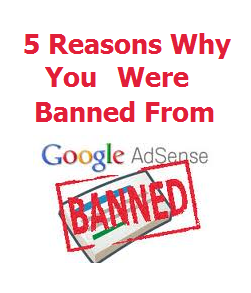I have been using Google Adsense adverts for the last three years to monetize my websites and of course I have read and seen many 
Click Fraud
Click fraud is the term given when publishers intentionally click on their own adverts to earn themselves more money. It is against Google’s policy and therefore taken very seriously with most cases resulting in a ban. There are some publishers out there that think they can cheat the system and still perform click fraud. However, they will be found out. Google can determine a fraudulent click from numerous stats they gain such as IP addresses, the computer used, time on site etc. to produce the most accurate and true results. Even if you didn’t mean to click on your own adverts, it still counts as click fraud. This is the biggest reason why publishers are banned.
Click Attacks
This can be deemed very similar to click fraud. However, instead of you performing fraudulent clicks, others are instead. Reasons for click attacks include:
- Family and Relatives – The chances are they don’t have a clue about the consequences of click fraud. Therefore, to try and help you and your website, they click on adverts to gain you extra earnings.
- Competitors – If your website is based in a market which is very competitive, other website owners may perform strategic click attacks to your website in an attempt to stop you earning money. This ultimately may result in you stopping your website if there is no financial incentive.
It is a lot more difficult to get banned from click attacks because it is out of your control. The likeliest outcome to happen is that Google Adsense will register the clicks but will not produce you any earnings. If this happens, notify Google as soon as possible as evidence to suggest that this is a click attack and not click fraud.
Unhealthy Traffic Sources
Google wants the websites that use Adsense to gain traffic organically or from legitimate sources. Websites that increase your traffic by making web users view your webpage for a fixed time for some form of currency or credit will be seen by Google and then banned. I read a story that a blogger started using Adsense when he finished his first website. He used some of these websites to try and gain some short term traffic. Around 24 hours later he was banned from Adsense. Therefore, if you are banned, look at where you are getting your traffic from.
Inappropriate Content
This almost goes without saying. However, I think I should still include it because people still get banned for it. Websites that hold inappropriate content cannot use Adsense and therefore will get banned. It doesn’t have to be the whole website that causes the website to be banned from Adsense. All it takes is one article, one paragraph or even one sentence that does not follow Adsense’s rules and guidelines. Therefore, if you cannot understand why you have been banned, search through your website’s content for any inappropriate content.
Sharp Traffic Increases
Although unlikely, programs such as Adsense do get suspicious when your websites gets strong increases in traffic over short periods of time. For example, if your website was getting 1,000 views a month (yes, its a low traffic website!) and suddenly received 1,000,000 views in one day, Google will be very suspicious about that traffic and therefore may decide to play safe than sorry and prevent the adverts from being viewed by the 1,000,000 or even ban you.



